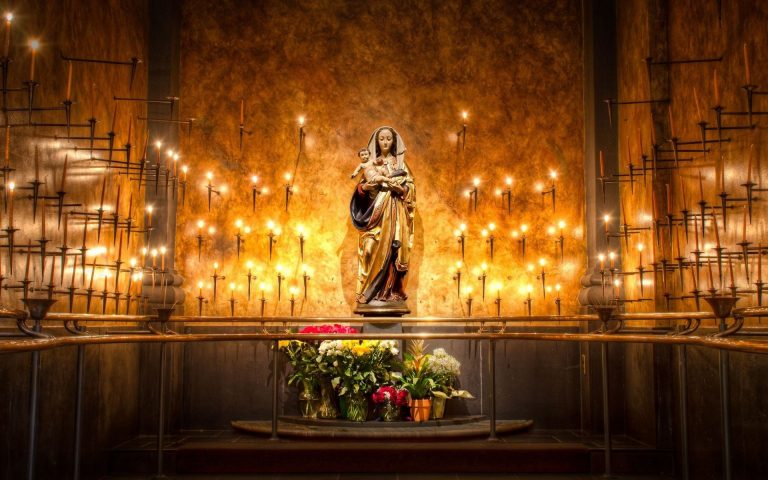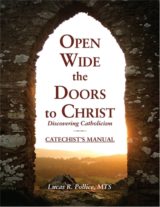By Lucas R. Pollice
Lucas Pollice is the director of Adult Catechesis and RCIA for the Diocese of Fort Worth, Texas. He has taught RCIA for over ten years and is a regular speaker at catechetical conferences. He is the author of Open Wide the Doors to Christ: Discovering Catholicism.

One of the significant and most common misconceptions about Catholicism is that Catholics worship Mary. But Catholics worship only God; they do not worship Mary. Her whole mission and disposition as the mother of Jesus is to bring others into closer communion with her Son. She would be the most horrified if anyone were to worship her. However, the Church does hold a special honor for her because of who she is and her unique relationship with Christ. For a proper understanding, we need to make some important distinctions.
Latria is the Latin word for “adoration or worship.” Adoration, worship, and homage are reserved for God alone. Thus, it is only the Father, the Son, and the Holy Spirit who are due adoration or worship. No creature, no matter how good or holy, ever deserves worship or adoration. The same applies to Mary and the saints.
Dulia is the Latin word meaning “veneration.” We venerate, or give honor, to a created person due to their excellence or virtue. We do this all the time with historical figures. For example, we give honor to George Washington for being the first president of the United States. We honor those who have fallen in battle or given their lives in the line of duty. We honor many people because of their heroic virtue and excellence in their lives.
In the same way we venerate (dulia) the saints because they achieved great excellence and holiness while on earth. During their lives they displayed heroic virtue in following the footsteps of Christ. The saints serve as exemplary models of what it means to be a follower of Christ and how to truly be transformed by His grace.
Our veneration of the saints does not end with them, but ultimately gives glory to God and fosters a greater union with Him, because it reveals to us His saving power and spurs us on to strive for greater holiness and communion with Christ. Far from worshipping saints, we honor them and look up to them so that we may better worship and love God.
Hyperdulia is an exalted level of honor given to Mary because of her exceptional holiness and her unique role in God’s plan of salvation as the Mother of God. Her excellence, heroic virtue, faith, and trust in God rise above that of every other creature. Mary is the perfect model of what it means to be a follower of Jesus. The Bible tells us that all generations will call Mary blessed (Luke 1:47–48). As we will see later, it is proper and just to give Mary special honor or devotion for the unique and extraordinary role she played and the virtue and grace she possessed.
Therefore, we rightly give special veneration and honor (hyperdulia) to Mary, and in no way is this adoration or worship. She holds a special place in the heart of the Church and of all believers because she holds a special place in the heart of her Son. Far from being a distraction from God, Mary draws us closer to Him and always points us in the direction of her Son by her faith and example. She still is today as she was while on earth—the one through whom Christ comes to His people.
We want to always have a true and right devotion to Mary so that we may know her and love her as the mother of Jesus and as our spiritual mother. There are two extremes to be avoided.
The most extreme form of Marian excess makes Mary equal to God or claims that she has divine qualities. Not so. She is a creature of God who was in need of salvation like all the rest of us. Another error is a devotion to Mary that “eclipses” or overshadows our relationship with Christ. Devotion to Mary should always bring us closer to Christ and not distract us from Him. This second form of Marian excess usually happens unintentionally and springs from an overemphasis on her in the spiritual life. Mary should always be a way to a deeper and more profound knowledge and communion with Christ, not a diversion or obstacle.
Marian defect is the opposite extreme of Marian excess. It minimizes the special role that Mary played in God’s plan of salvation and undervalues the unique and unsurpassed heroic virtue she lived in her relationship with Him. Marian defect tends to claim that Mary was just another good disciple of Christ.
Jesus is one divine Person with two natures, human and divine, which are absolutely inseparable. By the proclamation of Mary as the Mother of God, the truth of the unity of Christ’s two natures in one Person was preserved, which refuted the Nestorian heresy that claimed that Christ’s natures were two different persons. Hence, a proper understanding of Mary means a proper understanding of Christ.
Mary is not only the Mother of God, she is also the mother of the sons and daughters of God that have been redeemed through her Son. The last great gift that Jesus gave to the Church before His death was the gift of His mother. Thus, Mary is also our mother, our spiritual mother. Like any mother she nourishes us, guides us, and protects us on our spiritual journey. She desires the best for us, which is union with her Son. Her intercession is powerful, and she is constantly praying for all of us that we may become holy. Devotion to Mary is a wonderful part of belonging to Christ’s family the Church.
You Might Also Like

Open Wide the Doors to Christ is a powerful tool for both teachers and students of the Catholic faith. As an excellent resource for RCIA and Adult Faith Formation, this insightful book discusses the basics of the Catholic faith and how we can live it fully.

